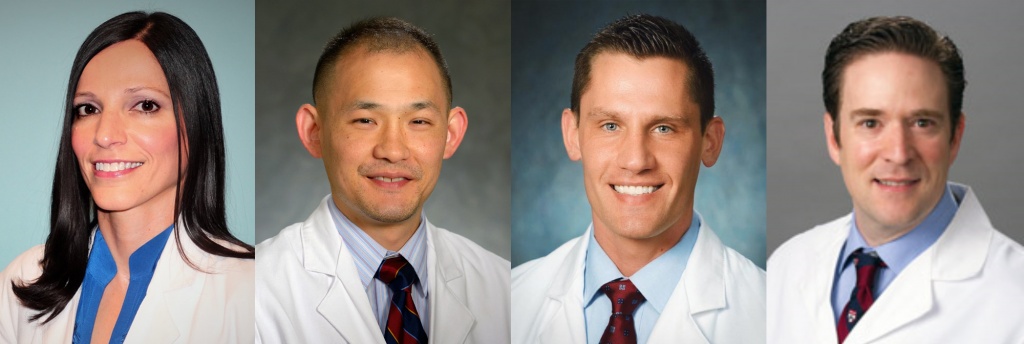Resource Library
Start Reading

The prospect of oral and maxillofacial surgery might sound scary if it’s unfamiliar. To give our readers and patients a more personalized look into the oral surgery experience at Penn Dental Family Practice (PDFP), we interviewed four of our oral surgeons: Dr. Brian Ford, Dr. Helen Giannakopoulos, Dr. Steven Wang, and Dr. Lee Carrasco—all of whom are both dentists and physicians.
Below, you’ll find the details of our conversation with each of these doctors. We discussed what they do and why, the changes to oral surgery in recent years, and more! Don’t miss out on the chance to find out more about these oral surgeons and what makes this dental medicine specialty so important.
Our oral surgeons come from all over the U.S. and have trained at many of the top dental and medical schools in the country.

1. Can you tell us a little about your background?
Dr. Ford
Hometown: Niskayuna, NY
College: Gettysburg College
Dental & Medical School: University of Pennsylvania
Residency: Hospital of the University of Pennsylvania.
Current Role: Assistant Professor, University of Pennsylvania Department of Oral and Maxillofacial Surgery
Dr. Giannakopoulos
Hometown: Chicago, IL
College: University of Illinois-Chicago
Dental & Medical School: University of Pennsylvania
Current Role: Residency Program Director, University of Pennsylvania
Department of Oral and Maxillofacial Surgery and temporomandibular joint (TMJ) surgeon, specializing in neurotoxin Botox for therapeutic purposes.
Dr. Wang
Hometown: Texas
College: Trinity University, San Antonio
Master of Public Health: George Washington University
Dental & Medical School: University of Pennsylvania
Current Role: Assistant Professor and the Director of the Oral Surgery Clinic at Penn Dental school
Dr. Carrasco
Hometown: Detroit, MI
Dental & Medical School: University of Detroit Mercy/University of Miami
Surgical Training: University of Pennsylvania
Dental Residency: UCLA
Current Role: Assistant Professor and the Director of the Oral Surgery Clinic at Penn Dental school
2. What motivated you to pursue dentistry and—in particular—your specialty?
Dr. Ford: My father is a physician and my mother is a nurse, so I was able to see the impact they had on our community as I was growing up. I went to dental school with plans to become a general dentist. It wasn’t until my third year of dental school that I had the opportunity to observe an orthognathic surgery, (a surgery needed when someone has misaligned jaws and can’t chew effectively). Over the course of a few hours, I saw the surgeon transform that person’s life. This experience led me to specialize in the field of oral and maxillofacial surgery.
Dr. Giannakopoulos: I trained under Dr. Peter Quinn, the former chairman and the head of clinical practice at the University of Pennsylvania. When I was a resident, I got involved in a study from 1995-2005. I was a co-investigator in the study and wrote one of the landmark papers for this patient group. Before that time, all TMJ prostheses were removed from the market because they were causing issues for patients. Dr. Quinn ended up inventing the prosthesis that we use now. Penn is the vanguard of TMJ surgery nationwide.
Dr. Wang: My dad was a physician and I saw how he helped people, so I always thought of doing something in the healthcare field. Once I got to dental school, I became drawn to oral surgery because it offers so many ways to help people. What really caught my interest was something called orthognathic surgery. This surgery can be life-changing from a functional and aesthetic standpoint. A large part of why I became an oral surgeon is so that I can help people who require this surgery.
Dr. Carrasco: I had the goal of being an oral surgeon since high school. I had the opportunity to work for a local oral surgeon in Detroit as a dental assistant and eventually, as an office manager. My goal from a young age was always to do what I’m doing now!
3. How have you seen your specialty change since you began practicing oral and maxillofacial surgery?
Dr. Ford: The biggest change in our field has been the incorporation of virtual surgical planning and other digital tools that help us to plan our surgeries and fabricate patient-specific implants/hardware. These technologies also allow us to plan and place dental implants with extreme precision. The advent of biologic modifiers such as Recombinant Human BMP-2 has allowed for better tissue engineering and more successful outcomes in complex cases.
Dr. Giannakopoulos: There have been many advances in implantology. When I was in dental school, it was just beginning to become popularized. Now, there are oral maxillofacial surgeons who have a better understanding of the needs of this patient group and can position the fibula to support implants. We’re also doing a lot of virtual-surgical planning, which helps us to know exactly where the implant will be placed.
Dr. Wang: From my experiences as an oral surgeon, I’ve seen changes in the utilization of certain technologies, such as virtual surgery planning and 3D printing. This is particularly true for orthognathic surgery—to use computers and software to plan where to move jaws—and also for complex dental implant surgeries. We now plan these surgeries on 3D models on the computer, and can 3D print guides and splints, rather than plan and create these by hand.
Dr. Carrasco: The majority of the things we do technically aren’t that different. But, the planning we do for patients is drastically different. Now, we have the ability to use planning technologies and 3D imaging to determine the best course of action, particularly in cases requiring reconstruction, dental implants, and orthognathic surgery.
4. What is your favorite part of your work at PDFP?
Dr. Ford: I get to see a wide range of patients with various needs, which keeps each day interesting. I enjoy meeting new patients and helping them with their concerns. With our ability to provide various levels of sedation and local anesthetic, every patient can have their needs met in a comfortable and safe way.
Dr. Giannakopoulos: I enjoy teaching residents. I feel that I have a great mix of teaching and treating patients.
Dr. Wang: My favorite part of working at PDFP is seeing patients get relief from pain when teeth need to be extracted, and the restoration of function and their smile with dental implants. Every day is different, from teaching dental students at Penn Dental, to performing more complex surgical procedures and teaching residents at the hospitals of Penn Health System.
One of my most enjoyable days of the week is the day I work at PDFP where I can perform more basic oral surgery procedures such as teeth extractions, wisdom teeth extraction, and dental implant placement for people who are in need.
Dr. Carrasco: My favorite part is working with patients and seeing their outcomes. For example, I might have a patient with a bite that doesn’t function well or an issue with appearance. When I can help restore function and see the smile on a patient’s face and the way they feel about themselves—it’s the most gratifying part of my work.
5. What makes Penn Dental unique?
Dr. Ford: At PDFP, the nicest thing is the collaborative approach to patient care. With oral and maxillofacial surgeons, restorative dentists, prosthodontists, endodontists, periodontists, pedodontists, orthodontists, and oral medicine all under one roof, we are able to provide the highest level of care.
Dr. Giannakopoulos: It’s a multi-specialty practice, which makes it unique. There are other multi-specialty practices out there, but not to the same extent. It’s great to be able to collaborate with specialists and general dentists on both patient care and research.
Dr. Wang: The facilities are excellent, but what makes Penn Dental unique is that we have every type of dentist and dental specialty under one roof: from general dentistry to orthodontics, periodontics, and endodontics. We have the ability to directly communicate with each other to take care of mutual patients, which makes for a better patient experience.
Dr. Carrasco: What’s wonderful about Penn Dental Family Practice is that we have experts within every dental specialty in one group. So we’re always communicating within the same chart, going to conferences together, and collaborating as colleagues. This environment allows us to use the expertise of all the different practitioners to give patients the best outcomes.
6. If someone was struggling with whether to commit to oral maxillofacial surgery, what would you tell them?
Dr. Ford: All the oral maxillofacial surgeons at PDFP are both dentists and physicians. That unique background gives us the ability to approach patient concerns from both a medical and a dental perspective. I also think that our extensive training with anesthesia helps us to ensure that procedures are comfortable and pain-free.
Dr. Giannakopoulos: We have highly-qualified specialists that practice at Penn Dental and we are adaptable to meet each patient’s needs, from simple extractions to advanced treatments. We have the latest technological advancements to facilitate their care. Our priority is to deliver individualized care because we recognize that everyone has different needs.
Dr. Wang: Especially for oral surgery, the thought of having teeth extracted, having dental implants placed, or having jaw surgery can be scary for patients. However, we do all that we can to make people comfortable and address their concerns. We have tools such as local anesthesia, nitrous oxide, and IV sedation to provide a comfortable patient experience. Our goal is to ease their fears and provide excellent care. All of the oral surgeons at PDFP have gone through extensive dental and medical training, and are experts in the field.
Dr. Carrasco: We try to give patients the best information we have so that they can make an informed decision. We recognize that these procedures aren’t as straightforward as most dental work, so I really encourage patients to come and ask questions until they feel comfortable with the process.
If you have impacted wisdom teeth that require surgical extraction or need more advanced care like reconstructive surgery or bone grafting, you’ll be in expert hands at PDFP.
If you have questions about oral surgery, download our complimentary eBook, “Your Comprehensive Guide to Oral Surgery,” to learn more about what to expect and how to prepare for surgery. If you are ready to meet a Penn oral surgeon, call our oral surgery department at 215-898-7337 to schedule an appointment with one of these experienced surgeons.